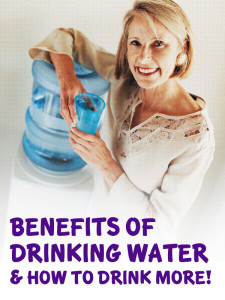In today’s medicine-centric world there seems to be a pill for everything. Whether you have a headache, digestive problems, or want to lose weight, there is a “magic” pill that can take care of all your problems. But do you ever stop and wonder what might be causing these problems in the first place? Yes, a pill can take care of the pain, but why not take precautions to prevent the pain from ever occurring in the first place? One of the most simple solutions to these problems is also one of the main culprits that cause them: water. According to a report conducted by Boston College, nearly two-thirds of Americans drink a quart less of water than they should each day. By not fulfilling your body’s basic needs for water you will become dehydrated, leading to the minor aches and pains of daily life. These include headaches, muscle fatigue, and digestive problems. For aging adults, these problems are amplified because their bodies require additional fluids to
keep them healthy. Before you reach for the pain killers, you might want to consider increasing your daily water intake instead.
The Benefits of Water

The benefits of water are plentiful. It keeps your joints loose, helps with your digestion process, and can even aid in keeping your memory sharp. For aging adults, these issues are all too common. By staying properly hydrated, aging adults can alleviate minor aches and pains like these that arise throughout the day, and can aid in a longer, healthier life. Imagine your body as a machine. A well-hydrated body is like a well-oiled machine. All the parts and pieces run smoothly and work efficiently, requiring little to no maintenance on a daily basis. On the other side, a dehydrated body is like a dry, rusty machine. All the parts and pieces don’t work as they were designed to leading to complications and impending break downs.
This simple analogy might help you understand the big picture of the importance of keeping hydrated, but what about the specifics? Below are some of benefits that keeping your body hydrated can provide for aging adults:
Maintains proper levels of body fluids
The majority of your body (around 60%) is made up of water, and these bodily fluids play a vital role in your daily health. For example, these fluids help with circulation, digestion, creation of saliva, transportation of nutrients, and maintaining body temperature. So naturally, when your body is dehydrated these bodily fluids cannot perform up to their ideal levels. Remaining hydrated will help your body work as it is supposed which can prevent health problems in the future.
Keeps Joints Loose
Your joints require a lot of lubrication to work properly, and this is true ten-fold for aging adults as the fluids in their joints decrease with age. Fight the pains of achy joints by drinking more water and you will notice how much of a difference hydration makes.
Helps with the digestive process
An individual’s digest tract requires fluids to ensure it runs smoothly. A dehydrated
body will lead to poor circulation of the digestive tract which leads to stomach pains and constipation. Proper hydration can improve the fluidity of the digestive tract and can help rid your need for products like Pepto Bismol.
Keeps your memory sharp
Keeping a sharp memory might be as simple as drinking more water. Although it is not a magic solution to memory loss, proper hydration allows your brain to work more efficiently leading to an increase in neural activity. Drink more water and you will maintain healthier brain function which can lead to a better memory.
Keeps muscles energized
When people exercise their muscles use electrolytes and fluids to work. When the body looses these nutrients, the cells begin to shrivel leading to a feeling of weak, achy muscles and lack of performance. By drinking water, you can hydrate these cells and allow them to work more efficiently, ultimately energizing your muscles.
Helps aid kidney function
The main purpose of kidneys is to filter and reprocess blood to remove unwanted toxins from the body. As a person ages, their kidneys begin to deteriorate and require additional fluids to work properly. By drinking more water, an aging adult will see an increase in kidney function which can lead to a greater feeling of well-being and health on a daily basis.
Tips for Drinking More Water
Ensuring you are properly hydrated is no secret, so why do we forget to drink the necessary amount of water our bodies need each day? The answer is simple, we just don’t think about it. When it comes to eating the reminders are simple, when you are feeling hungry, you eat. However, when your body is dehydrated, you often won’t know until it’s too late and you are parched. In order to remember to drink enough water each day, follow these simple tips:
Carry a bottle of water everywhere you go
You will be amazed at how much more water you will drink (and how little you did before) when you carry around your own bottle of water. The visual reminder of the water bottle will entice you to drink more and works much better than trying to remember to fill a glass on your own.
Drink before, after, and during exercise
Even the simplest of aerobic activities require you to be properly hydrated; the problem
is that we often don’t drink water until we are done and thirsty. This is your body telling you that you’re dehydrated. Instead, drink a glass of water before you do any aerobic activities, and make sure you have a water bottle on hand during the activity as well.
Have a pitcher of water in the fridge that is easy to access
By setting aside an amount of water that you want to drink each day, you can set a goal that you can visually measure. Rather than try to remember how many glasses
of water you drink each day, you will be able to tell wether or not you have finished your pitcher or not.
Have a glass of water with every meal
People often don’t drink water with their meals. Rater than reach for a soda each meal, try
drinking a glass of water. This will help remind you to drink more water since you will be eating at least three meals a day. Furthermore, water with your meal will help during the digestive process.
